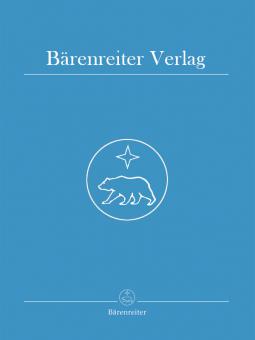Jean-Philippe Rameau
Le Temple de la Gloire RCT 59
Opera-ballet with one prologue and 3 acts - Versions of 1746 and 1745
Jean-Philippe Rameau
Le Temple de la Gloire RCT 59
Opera-ballet with one prologue and 3 acts - Versions of 1746 and 1745
- Compositor Jean-Philippe Rameau
- Editor Julien Dubruque
- Editorial Bärenreiter Verlag
- Nº de pedido BA8859-01
IVA incluido.,
Más gastos de envío
No disponible en todos los países. Leer más
Descripción de la:
Rameau's only surviving opera based on a libretto by Voltaire has survived in two versions (1745 and 1746), whereby the 1745 version was long considered lost. Volume IV.12 of the series 'Opera omnia Rameau' presents a complete edition which enables performances of both versions.
Voltaire refers to Metastasio in his libretto in that he wishes to liberate the opera from the gallant milieu and to make it a moralizing stage work that is equally edifying and political. After a prologue dedicated to envy personified, the tyrants Bélus and Bacchus are chased out of the Hall of Fame and finally Trajan is crowned with laurels for defeating the rebels, forgiving them and ultimately turning the Hall of Fame into a public temple.
The music contains many remarkable passages, such as a richly orchestrated overture, the famous monologue 'Profonds abîmes du Ténare' with obbligato bassoons, and Trajan's artful final scene 'Ramage d'oiseaux'.
Voltaire refers to Metastasio in his libretto in that he wishes to liberate the opera from the gallant milieu and to make it a moralizing stage work that is equally edifying and political. After a prologue dedicated to envy personified, the tyrants Bélus and Bacchus are chased out of the Hall of Fame and finally Trajan is crowned with laurels for defeating the rebels, forgiving them and ultimately turning the Hall of Fame into a public temple.
The music contains many remarkable passages, such as a richly orchestrated overture, the famous monologue 'Profonds abîmes du Ténare' with obbligato bassoons, and Trajan's artful final scene 'Ramage d'oiseaux'.

